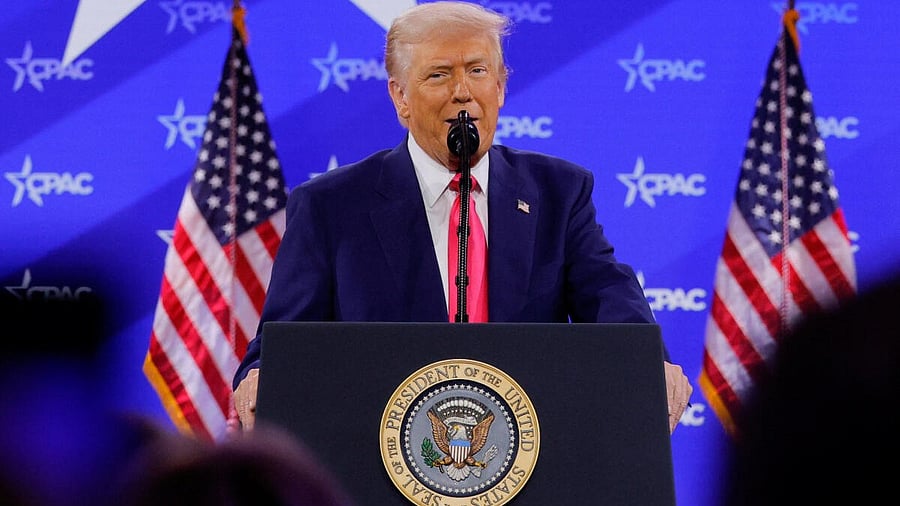
US President Donald Trump.
Credit: Reuters Photo
The United States-Russia diplomatic talks last week in Riyadh caused consternation in European capitals and Kyiv. US President Donald Trump and Russian President Vladimir Putin had decided that Secretary of State Rubio and Foreign Minister Lavrov would discuss, without the involvement of European allies or Ukraine, not only the revival of bilateral relations but also prospects for peace in Ukraine and lifting Western sanctions on Russia.
Trump’s approach to security and tariffs, his Vice President JD Vance’s blunt criticism of European institutions at the Munich Security Conference and his Defence Secretary Pete Hogseth’s expectations for NATO allies in Brussels indicate a reset in US policy, calling for greater burden-sharing by allies. It caught European leaders off guard, leaving them scrambling to sustain the old alliance.
The fast-moving developments call for a reassessment of three key issues – the transatlantic security alliance, the responsibility of a superpower to lead during global strategic and economic flux and the dynamics of emerging power structures.
The Ukraine conflict
Peace, which had seemed elusive in the Ukraine conflict, may now be possible. Earlier peace talks sponsored by Europe failed to bring Russia to the negotiating table, while Turkish mediation lacked European support.
The conflict has led to loss of lives, destruction of infrastructure and economic devastation, with no clear end in sight. The war has persisted due to Western military support and little incentive for Russia to negotiate. With Trump reviewing US support and demanding returns on past assistance, Europe and Ukraine must reassess the viability of continuing the conflict.
Trump and Putin appear to have an understanding of a potential resolution, even if it is unfavourable to Ukraine. Unsurprisingly, Russian demands remain maximalist, ruling out Ukraine's NATO membership and the stationing of European troops on its eastern flank. However, Putin has acknowledged that Ukraine must be engaged at an appropriate stage. From Russia’s perspective, ending the conflict could facilitate normalisation of relations with the West, reduce dependence on China, and restore its global stature. Zelenskyy may need to consider negotiating peace to enable reconstruction, economic revival and leadership transition.
Trump’s direct negotiations with Russia have also expanded the mediating role of other powers. Turkey, which previously hosted Russian and Ukrainian negotiators and facilitated the Black Sea grain deal, could again play a role. Saudi Arabia has positioned itself as a mediator and could contribute to easing the Israel-Palestine conflict. China has also signalled interest in joining a broader diplomatic effort.
Transatlantic security alliance
Even after the Cold War, the transatlantic alliance remained reliant on US military support, while European military capability remained weak. Many in Eastern Europe were drawn to the European Union's economic growth and democracy, alongside NATO’s protective cover. However, Europe's persistent portrayal of Russia as an adversary has shaped its policies, despite brief periods of engagement with Russia through the G8 and economic ties.
Trump’s push for Europe to take greater responsibility for its security, along with his protectionist tariffs, has put European leaders in a difficult position. Their options are limited – they must either negotiate with Trump to maintain US troop presence while building their own defence capabilities, reassess the nature of the Russian threat and engage with Moscow for mutual benefit, or seek security guarantees from non-European powers, a move Western Europe is unlikely to favour.
Europe’s key challenges in the 21st century stem from internal factors – democratic practices have alienated many, leading to a clash between liberal and right-wing politics; social welfare burdens and outsourced manufacturing have slowed economic growth; demographic shifts due to ageing and migration are reshaping societies; and adapting to a more transactional global order has been sluggish. However, assuming greater strategic responsibility could spur Europe’s economic revival and foster stronger international partnerships.
Restoring Russian energy supplies and gaining access to Russian markets, or leveraging China for infrastructure renewal and economic growth (while remaining cautious of its security influence), could be beneficial. Additionally, a cooperative approach towards Africa and Asia, the fastest-growing economic regions, could position Europe more favourably in the global order.
Dynamics of new power structures
Trump’s eagerness to secure a deal with Russia suggests his primary geopolitical focus is the Indo-Pacific. By reducing US involvement in prolonged conflicts in Europe and the Middle East, he aims to redirect resources towards countering challenges and opportunities posed by China.
The current reality is that the US and China are the only two powers capable of engaging globally, yet neither is willing to fully assume the costs or responsibilities of shaping the future of global governance. As the world moves towards multipolarity, the gap in power between major nations and middle-ranking powers is narrowing. Middle powers are demanding greater influence in regional affairs and are developing capacities to engage in global issues sustainably. In many ways, this aligns with Trump’s vision of making America strong while disengaging from costly conflicts.
The Indo-Pacific has overtaken the transatlantic region as the hub of manufacturing and globalisation, emerging as a centre for wealth creation, technological innovation, and economic transformation. The US's leadership role will depend not only on its economic growth but also on its ability to remain central to these global shifts. Washington must define its engagement with China while simultaneously empowering middle powers in the region. This will require partnerships built on trust and reliability. For India, the changing global order presents an opportunity to establish itself as a key player in shaping the new geopolitical landscape.
(The writer is a former diplomat and a Professor of Diplomatic Practice at Jindal Global University.)